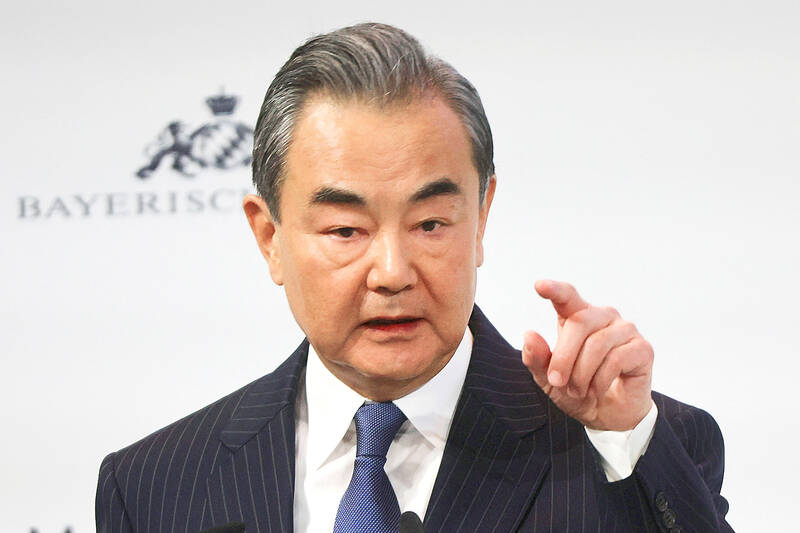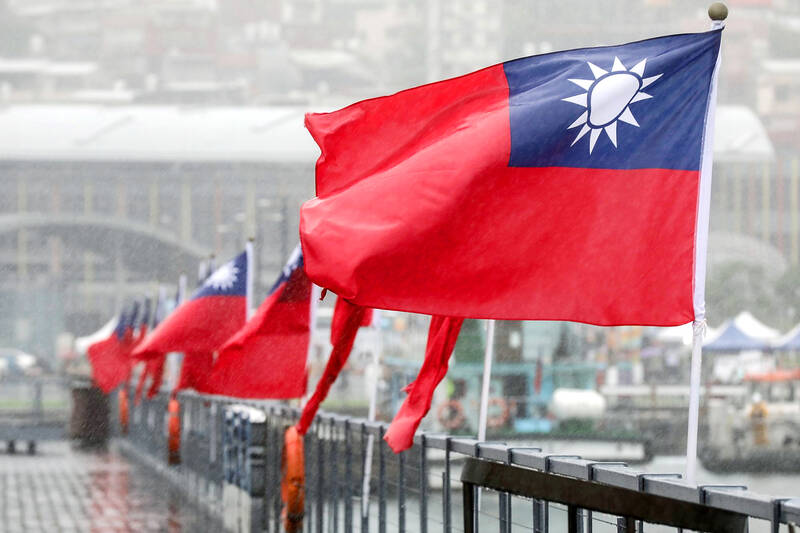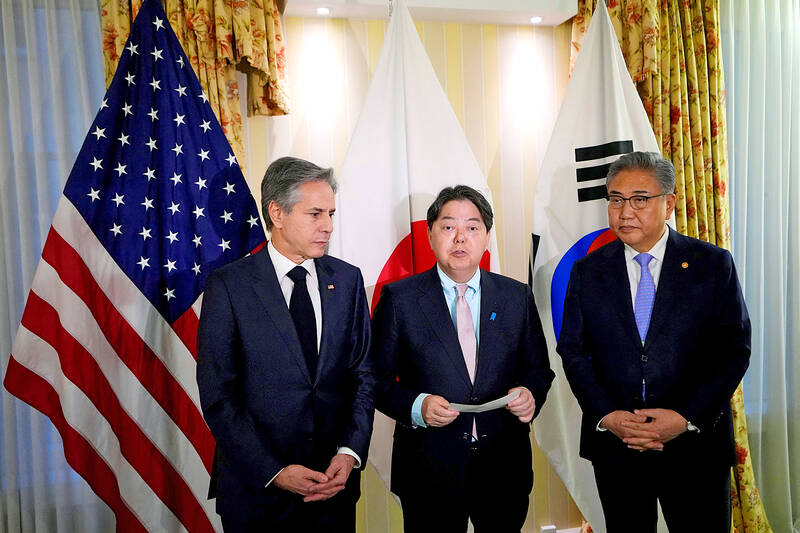The Mainland Affairs Council (MAC) yesterday protested against claim by China’s top diplomat Wang Yi (王毅) that Taiwan is part of China.
At the Munich Security Conference on Saturday, Wang, the Chinese Communist Party’s most senior foreign policy official, said that “Taiwan has been a part of China since ancient times. It is never a country and never will be a country.”
It is not China that wants to change the “status quo,” but those “separatists who advocate for Taiwan’s independence do,” he said, adding that calling for Taiwanese independence is incompatible with peace and stability across the Taiwan Strait.

Photo: Reuters
Only by opposing it and following the “one China” principle can peace across the Strait be maintained, he said.
Just as countries around the world call for Ukraine’s sovereignty and territorial integrity to be maintained, Chinese sovereignty and territorial integrity should be protected, he said, adding that “there shouldn’t be double standards on major issues.”
Using Taiwan’s official name, the MAC said in a statement yesterday that the Republic of China (ROC) is a sovereign nation that has never been and never will be a part of the People’s Republic of China.

Photo: I-Hwa Cheng, Bloomberg
The “status quo” across the Taiwan Strait is that the “two sides across the Strait do not belong to one another,” it said, adding that the “one China” principle is China’s attempt to belittle Taiwan and distort the truth.
China’s attempt to mislead other countries has never been recognized by the international community, the MAC said.
While the world jointly condemns Russia’s invasion of Ukraine, which began almost a year ago, there are heightened concerns about Taiwan’s security, it said.

Photo: Reuters
Beijing lacks the courage to condemn Russia’s aggression, and instead calls the global “consensus” against authoritarian expansionism “double standards,” which only adds to the international community’s doubts and opposition against it, it said.
The MAC called on Beijing to adjust its coercive position against Taiwan and take on the responsibility of maintaining regional security and improving cross-strait relations.
US Secretary of State Antony Blinken and Japanese Minister of Foreign Affairs Yoshimasa Hayashi in separate meetings with Wang on the sidelines of the Munich Security Conference reiterated the importance of peace across the Taiwan Strait.
Blinken, during an informal meeting with Wang, said that the US has not changed its “one China” policy, and underlined the importance of maintaining peace across the Taiwan Strait, the US Department of State said in a statement.
Blinken also reiterated US President Joe Biden’s position that the US would defend its values and interests, but does not want conflict with China or seek a new Cold War, adding that it is important for the two countries to maintain effective communication channels.
The Japanese Ministry of Foreign Affairs said that Hayashi and Wang talked for about 50 minutes, during which time Hayashi restated his nation’s position regarding “specific balloon-shaped flying objects” detected in Japan’s airspace, and demanded that intrusions into its airspace never happen again.
Japan is deeply concerned about the situation in the East China Sea, including the Diaoyutai Islands (釣魚台) in the East China Sea — known as the Senkaku Islands in Japan — and the frequent military actions taken by China and Russia around Japan, Hayashi said, adding that peace and stability in the Taiwan Strait is also important.
This story has been amended since it was first published.

A magnitude 5.6 earthquake struck off the coast of Yilan County at 12:37pm today, with clear shaking felt across much of northern Taiwan. There were no immediate reports of damage. The epicenter of the quake was 16.9km east-southeast of Yilan County Hall offshore at a depth of 66.8km, Central Weather Administration (CWA) data showed. The maximum intensity registered at a 4 in Yilan County’s Nanao Township (南澳) on Taiwan’s seven-tier scale. Other parts of Yilan, as well as certain areas of Hualien County, Taipei, New Taipei City, Taoyuan, Hsinchu County, Taichung and Miaoli County, recorded intensities of 3. Residents of Yilan County and Taipei received

Taiwan has secured another breakthrough in fruit exports, with jujubes, dragon fruit and lychees approved for shipment to the EU, the Ministry of Agriculture said yesterday. The Animal and Plant Health Inspection Agency on Thursday received formal notification of the approval from the EU, the ministry said, adding that the decision was expected to expand Taiwanese fruit producers’ access to high-end European markets. Taiwan exported 126 tonnes of lychees last year, valued at US$1.48 million, with Japan accounting for 102 tonnes. Other export destinations included New Zealand, Hong Kong, the US and Australia, ministry data showed. Jujube exports totaled 103 tonnes, valued at

TRUST: The KMT said it respected the US’ timing and considerations, and hoped it would continue to honor its commitments to helping Taiwan bolster its defenses and deterrence US President Donald Trump is delaying a multibillion-dollar arms sale to Taiwan to ensure his visit to Beijing is successful, a New York Times report said. The weapons sales package has stalled in the US Department of State, the report said, citing US officials it did not identify. The White House has told agencies not to push forward ahead of Trump’s meeting with Chinese President Xi Jinping (習近平), it said. The two last month held a phone call to discuss trade and geopolitical flashpoints ahead of the summit. Xi raised the Taiwan issue and urged the US to handle arms sales to

BIG SPENDERS: Foreign investors bought the most Taiwan equities since 2005, signaling confidence that an AI boom would continue to benefit chipmakers Taiwan Semiconductor Manufacturing Co’s (TSMC, 台積電) market capitalization swelled to US$2 trillion for the first time following a 4.25 percent rally in its American depositary receipts (ADR) overnight, putting the world’s biggest contract chipmaker sixth on the list of the world’s biggest companies by market capitalization, just behind Amazon.com Inc. The site CompaniesMarketcap.com ranked TSMC ahead of Saudi Aramco and Meta Platforms Inc. The Taiwanese company’s ADRs on Tuesday surged to US$385.75 on the New York Stock Exchange, as strong demand for artificial intelligence (AI) applications led to chip supply constraints and boost revenue growth to record-breaking levels. Each TSMC ADR represents